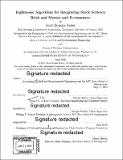Fulfillment algorithm for integrating stock between brick and mortar and E-commerce
Author(s)
Foster, Scott Douglas, M.B.A. Sloan School of Management
DownloadFull printable version (3.030Mb)
Other Contributors
Leaders for Global Operations Program.
Advisor
Patrick Jaillet and Georgia Perakis.
Terms of use
Metadata
Show full item recordAbstract
This thesis proposes a novel fulfillment algorithm which maximizes profits and customer experience through optimal distribution in a multi-period setting for a set of shipping locations that includes both stores and online-only warehouses. Myopic methods do not account for the temporal aspects of the problem. For example, a store should not ship an item to an online customer if there is high expected future demand for that item in-store. Instead, that item should be shipped from a store or warehouse where future expected demand is lower. This optimal choice of fulfillment location increases system-wide profits by preventing cannibalization as well as potentially selling the item before it reaches the sales period. The proposed algorithm also considers important variables related to customer experience such as the amount of time the order will take to be delivered. This algorithm was designed and tested at Zara, a subsidiary of Inditex S.A. A mixed integer program with two periods accounting for expected demand now and in the future is shown to optimally solve for how to fulfill any arbitrary order. However, this algorithm is intractable at larger order sizes. In this case, we create an online algorithm based on a heuristic. Use of this algorithm increases the total expected profit from any unit of inventory entering a store or warehouse by minimizing cannibalization and shipping costs. In addition, this algorithm minimizes the need for inventory re-allocation across the network. At Zara this algorithm was shown to improve the objective function by roughly 0.4% on a system-wide basis as compared to a myopic approach.
Description
Thesis: M.B.A., Massachusetts Institute of Technology, Sloan School of Management, in conjunction with the Leaders for Global Operations Program at MIT, 2018. Thesis: S.M., Massachusetts Institute of Technology, Department of Civil and Environmental Engineering, in conjunction with the Leaders for Global Operations Program at MIT, 2018. Cataloged from PDF version of thesis. Includes bibliographical references (pages 46-47).
Date issued
2018Department
Leaders for Global Operations Program at MIT; Massachusetts Institute of Technology. Department of Civil and Environmental Engineering; Sloan School of ManagementPublisher
Massachusetts Institute of Technology
Keywords
Sloan School of Management., Civil and Environmental Engineering., Leaders for Global Operations Program.